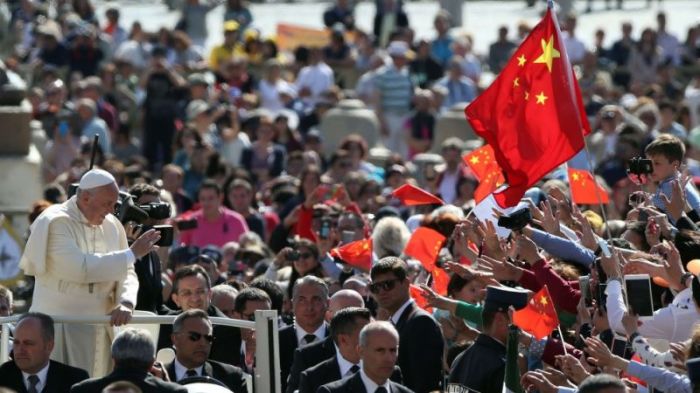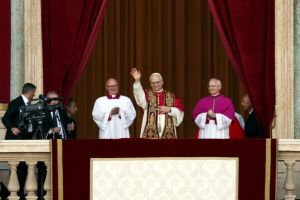China forces churches to sing national anthem, raise Chinese flag to honor Communist history

Catholic churches run by the Chinese state have been ordered to hold events in which parishioners sing China’s national anthem, pray for the nation, and raise the Chinese flag, sparking outrage among local Christians.
Persecution watchdog China Aid reports that ahead of China’s National Day on Oct. 1, the Chinese Patriotic Catholic Association, an organization associated with the Chinese government, and the Bishops’ Conference of the Catholic Church in China issued a statement declaring that Chinese Christians should take pride in the Communist Party’s leadership over the past 70 years and should hold events to celebrate it.
According to the statement, before each morning mass on Sunday, September 22, parishioners attending official Catholic churches in every region of the country must sing China’s national anthem, pray for the nation, and raise the Chinese flag.
The order sparked outrage among local Christians, who called the display of nationalism “outrageous.”
“Many churches in Hangzhou have been required to raise the national flag and sing the national anthem for a long while,” Mr. Zhou, an attendee of a non-government church in Hangzhou, said. “Now, China is back to an absurd era, and some regions are even worse than the Cultural Revolution era.”
One Christian from China’s Fujian province told China Aid that his church has even held patriotic song singing competitions and exhibitions of calligraphy, paintings, and photos to celebrate the National Day.
“Now, people are even forced to love the country,” he said. “Churches across the country are forced to participate in singing patriotic songs, which is very ridiculous because patriotic songs basically are linked with the chaotic era of the Cultural Revolution.”
Forced displays of nationalism within official churches in China are becoming increasingly common as the Chinese Communist Party attempts to “Sinicize” churches, or force them to conform to the government’s agenda and show devotion to the state.
Last week, it was reported that churches across China’s central province of Henan were forced to replace the Ten Commandments with President Xi Jinping’s quotes amid pressure from the government.
Because disobeying the orders is seen as opposing the Communist Party, some churches have been shut down for not implementing the rule, while other congregations have been threatened to be blacklisted by the government.
Earlier this month, Chinese government officials demanded that clergy affiliated with the state-sanctioned protestant church base their sermons on a new book that blends biblical teachings with the teachings of Confucius, one of the most influential philosophers in Chinese history.
Last year, human rights advocate Bob Fu testified at a congressional hearing in Washington, D.C., saying that the Chinese government has directed the state-sanctioned Three-Self Patriotic Movement and the Chinese Christian Council to work on a five-year plan to “sinicize” the Bible, including possible re-translations of the Bible and rewrites of biblical commentaries.
According to Fu, the re-translation of the Bible would include a summary of the Old Testament with Buddhist and Confucian teachings and new commentary for the New Testament.
"There are outlines that the new Bible should not look westernized and [should look] Chinese and reflect Chinese ethics of Confucianism and socialism," Fu told The Christian Post after last September’s House hearing. "The Old Testament will be messed up. The New Testament will have new commentaries to interpret it."
China is currently ranked at number 43 out of the top 50 countries with the worst Christian persecution, according to the annual World Watch List from Open Doors USA.
David Curry, President and CEO of Open Doors told Mission Network News that forced nationalization of the Church is extremely dangerous because it asks believers to put secular leaders above biblical truth.
“If they allow Christians to exist, they want that Christian faith to be ‘Chinese’ or loyal to the government to validate government politics [and] policy,” Curry said. “The Chinese Church is wary of doing that because, of course, this nationalization of the Church means they may one day be forced to choose between Jesus and the Chinese government.”
“As it relates to China, we need to pray for this Church to mature, and quickly,” he added. “The Chinese Church is massive in size, but like the American Church, it’s big and it’s shallow. So we need this Church to grow up …. The Chinese Church has been underground for so long, it doesn’t know how to play a useful public role in law, in education, and in the policy world; so Christian faith hasn’t been integrated into all parts. We need to pray for that in China in a healthy way.”





























